2014年6月英语四级考试翻译题及答案全三套
6月英语四级真题翻译
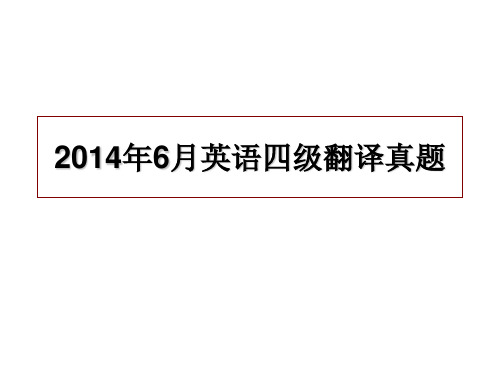
be willing to cooperate with others through reading, which is exactly fit for the purpose of education. It is more important for primary and secondary school students to read. Were they not interested in reading at the critical time, developing habit for reading in the future will be more difficult.
5. 阅读对于中小学生尤为 重要,
It is more important for primary and secondary school students to read.
6. 假如他们没有在这个关键时 期培养阅读的兴趣,以后要养 成阅读的习惯就很难了。
Were they not interested in reading at the critical time, developing habit for reading in the future will be more difficult.
3. 他们强调,人们应当读 好书,尤其是经典著作。
What they emphasized is reading good books, especially classical works.
4. 通过阅读,人们能更好地学会感 恩、有责任心和与人合作,而教育 的目的正是要培养这些基本素质。
People could better learn to feel grateful, have more sense of responsibility, be willing to cooperate with others through reading, which is exactly fit for the purpose of education.
6月英语四级考试翻译真题

6月英语四级考试翻译真题2014年6月英语四级考试翻译真题【2014年6月四级翻译真题】中国应进一步发展核能,因为核电目前只占其总发电量的2%,该比例在所有核国家中居第30位,几乎是最低的。
2011年3月日本核电站事故后,中国的核能开发停了下来,终止审批新的核电站,并开展全国性的核安全检查。
到2012年10月,审批才又谨慎地恢复。
随着技术和安全措施的改进,发生核事故的可能性完全可以降低到最低程度。
换句话说,核能是可以完全开发和利用的。
【翻译答案】China should further develope nuclear energy, because nuclear power currently accounts for only 2% of the total generating capacity. The proportion is in 30th among all nuclear-capable countries, which almost the lowest。
In March 2011, after the accident of Japanese nuclear power station, China stopped its nuclear energy development, with approvals for new nuclear power plants suspended, and national nuclear safety inspection carried out. Examine and Approval has been restored carefully since October, 2012.With the improvement of technology and safety measures, the possibility of nuclear accidents can be dropped to a minimum extent. In other words, the nuclear energy can be exploited and utilized safely。
2014年6月全国英语四级必考翻译(四级改革后关于传统文化)

The Great Wall is one of the wonders of the world that created by human beings! If you come to China without climbing the Great Wall, it's just like going Paris without visiting the Eiffel Tower; or going to Egypt without visiting the Pyramids! Men often say, "He who doest not reach the Great Wall is not a true man."In fact, it began as independent walls for different states when it was first built, and did not become the "Great Wall" until the Qin Dynasty. However, the wall we see today, starting from Shanhaiguan Pass in the east to Jiayunguan Pass in the west, was mostly built during the Ming Dynasty.
2014年6月大学英语四级真题及答案(精编版)

2014年6月大学英语四级真题及答案Part III Reading Comprehension (40 minutes)Section AQuestions 36 to 45 are based on the following passage.Global warming is a trend toward warmer conditions around the world. Part of the warming is natural; we have experienced a 20,000-year-long warming as the last ice age ended and the ice__36___away,However , we have already reached temperatures that are in __37__with other minimum-ice periods, so continued warming is likely not natural. We are __38__to a predicted worldwide in increase in temperatures__39__betweem 1℃ and 6℃over the next 100 years. The warming will be more__40__in some areas, less in other, and some places may even cool off. Likewise, the __41__of this warming will be very different depending on where you are-coastal areas must worry about rising sea levels, while Siberia and northern Canada may become more habitable(宜居的)and__42__for humans than these areas are now.The fact remains, however, that it will likely get warmer, on __43__, everywhere. Scientists are in general agreement that the warmer conditions we have been experiencing are at least in part the result of a human-induced global warming trend. Some scientists___44__that the changes we are seeing fall within the range of random(无规律的)variation-some years are cold, others warm, and we have just had an unremarkable string of warmyears__45___--but that is becoming an increasingly rare interpretation in the face of continued and increasing warm conditions.A) appealing B) average C) contributing D) dramaticE) frequently F) impact G) line H) maintainI) melted J) persist K) ranging L) recentlyM) resolved N) sensible O) shockSection BThe End of the Book?[A] Amazon, by far the largest bookseller in the country, reported on May 19 that it is now selling more books in its electronic Kindle format than in the old paper-and-ink format. That is remarkable, considering that the Kindle has only been around for four years. E-books now account for 14 percent of all book sales in the country and are increasing far faster than overall book sales. E-book sales are up 146 percent over last year, while hardback sales increased 6 percent and paperbacks decreased 8 percent.[B] Does this spell the doom of the physical book? Certainly not immediately, and perhaps not at all. What it does mean is that the book business will go through a transformation in the next decade or so more profound than any it has seen since Gutenberg introduced printing from moveable type in the 1450s.[C] Physical books will surely become much rarer in the marketplace. Mass market paperbacks, which have been declining for years anyway, will probably disappear, as will hardbacks for mysteries, thrillers, “romance fiction,” etc. Such books, which only rarely end up in permanent collections, either private or public, will probably only be available as e-books within a few years. Hardback and trade paperbacks for “serious” nonfiction and fiction will surely last longer. Perhaps it will become the mark of an author to reckon with that he or she is still published in hard copy.[D] As for children’s books, who knows? Children’s books are like dog food in that the purchasers are not theconsumers, so the market (and the marketing) is inherently strange.[E] For clues to the book’s future, let’s look at some examples of technological change and see what happened to the old technology.[F] One technology replaces another only because the new technology is better, cheaper, or both. The greater the difference, the sooner and more thoroughly the new technology replaces the old. Printing with moveable type on paper dramatically reduced the cost of producing a book compared with the old-fashioned ones handwritten on vellum, which comes from sheepskin. A Bible—to be sure, a long book—required vellum made from 300 sheepskins and countless man-hours of labor. Before printing arrived, a Bible cost more than a middle-class house. There were perhaps 50,000 books in all of Europe in 1450. By 1500 there were 10 million.[G] But while printing quickly caused the hand written book to die out, handwriting lingered on (继续存在) well into the 16th century. Very special books are still occasionally produced on vellum, but they are one-of-a-kind show pieces.[H]Sometimes a new technology doesn’t drive the old one out, but only parts of it while forcing the rest to evolve. The movies were widely predicted to drive live theater out of the marketplace, but they didn’t, because theater turned out to have qualities movies could not reproduce. Equally, TV was supposed to replace movies but, again, did not.[I] Movies did, however, fatally impact some parts of live theater. And while TV didn’t kill movies, it did kill second-rate pictures, shorts, and cartoons.[J] Nor did TV kill radio. Comedy and drama shows (“Jack Benny,” “Amos and Andy,” “The Shadow”) all migrated to television. But because you can’t drive a car and watch television at the same time, rush hour became radio’s prime, while music, talk, and news radio greatly enlarged their audiences. Radio is today a very different business than in the late 1940s and a much larger one.[K] Sometimes old technology lingers for centuries because of its symbolic power. Mounted cavalry (骑兵) replaced the chariot (二轮战车) on the battlefield around 1000 BC. But chariots maintained their place in parades and triumphs right up until the end of the Roman Empire 1,500 years later. The sword hasn’t had a military function for a hundred years, but i s still part of an officer’s full-dress uniform, precisely because a sword always symbolized “an officer and a gentleman.”[L] Sometimes new technology is a little cranky (不稳定的) at first. Television repairman was a common occupation in the 1950s, for instance. And so the old technology remains as a backup. Steamships captured the North Atlantic passenger business from sail in the 1840s because of its much greater speed. But steamships didn’t lose their sails until the 1880s, because early marine engines had a nasty habit of breaking down. Until ships became large enough (and engines small enough) to mount two engines side by side, they needed to keep sails. (The high cost of steam and the lesser need for speed kept the majority of the world’s ocean freight moving by sail until the early years of the 20th century.)[M] Then there is the fireplace. Central heating was present in every upper-and middle-class home by thesecond half of the 19th century. But functioning fireplaces remain to this day a powerful selling point in a house or apartment. I suspect the reason is a deep-rooted love of the fire. Fire was one of the earliest major technological advances for humankind, providing heat, protection, and cooked food (which is much easier to cat and digest). Human control of fire goes back far enough (over a million years) that evolution could have produced a genetic leaning towards fire as a central aspect of human life.[N] Books—especially books the average person could afford—haven’t been around long enough to produce evolutionary change in humans. But they have a powerful hold on many people nonetheless, a hold extending far beyond their literary content. At their best, they are works of art and there is a tactile(触觉的)pleasure in books necessarily lost in e-book versions. The ability to quickly thumb through pages is also lost. And a room with books in it induces, at least in some, a feeling not dissimilar to that of a fire in the fireplace on a cold winter’s night.[O] For these reasons I think physical books will have a longer existence as a commercial product than some currently predict. Like swords, books have symbolic power. Like fireplaces, they induce a sense of comfort and warmth. And, perhaps, similar to sails, they make a useful back-up for when the lights go out.46. Authors still published in printed versions will be considered important ones.47. Some people are still in favor of printed books because of the sense of touch they can provide.48. The radio business has changed greatly and now attracts more listeners.49. Contrary to many people’s prediction of its death, the film industry survived.50. Remarkable changes have taken place in the book business.51. Old technology sometimes continues to exist because of its reliability.52. The increase of e-book sales will force the book business to make changes not seen for centuries.53. A new technology is unlikely to take the place of an old one without a clear advantage.54. Paperbacks of popular literature are more likely to be replaced by e-books.55. A house with a fireplace has a stronger appeal to buyers.Section CPassage OneQuestions 56 to 60are based on the following passage.The question of whether our government should promote science and technology or the liberal arts in higher education isn’t an either/or proposition(命题),although the current emphasis on preparing young Americans for STEM(science, technology, engineering, maths)-related fields can make it seem that way.The latest congressional report acknowledges the critical importance of technical training, but also asserts that the study of the humanities (人文学科)and social sciences must remain central components of America’s educational system at all levels. Both are critical to producing citizens who can participate effectively in our democratic society, become innovative(创新的)leaders, and benefit from the spiritual enrichment that the reflection on the great ideas of mankind over time provides.Parents and students who have invested heavily in higher education worry about graduates’ job prospects as technological advances and changes in domestic and global markets transform professions in ways that reduce wages and cut jobs. Under these circumstances, it’s natural to look for what may appear to be the most “practical” way out of the problem “Major in a subject designed to get you a job” seems the obvious answer to some, though this ignores the fact that many disciplines in the humanities characterized as “soft” often, in fact, lead to employment and success in the long run. Indeed, according to surveys, employers have expressed a preference for students who have received a broadly-based education that has taught them to write well, think critically, researchcreatively, and communicate easily.Moreover, students should be prepared not just for their first job, but for their 4th and 5th jobs, as there’s little reason to doubt that people entering the workforce today will be called upon to play many different roles over the course of their careers. The ones who will do the best in this new environment will be those whose educations have prepared them to be flexible. The ability to draw upon every available tool and insight—picked up from science, arts, and technology—to solve the problems of the future, and take advantage of the opportunities that present themselves, will be helpful to them and the United States.注意:此部分试题请在答题卡2上作答。
2014年6月大学英语四级真题及解答(多套题及详解)
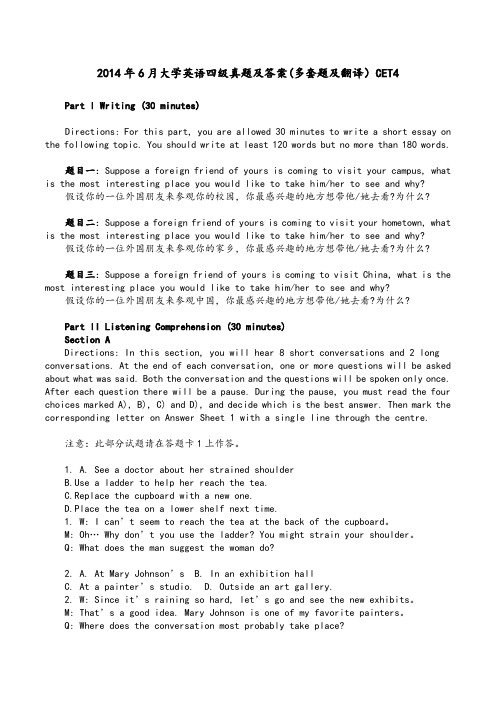
2014年6月大学英语四级真题及答案(多套题及翻译)CET4 Part I Writing (30 minutes)Directions: For this part, you are allowed 30 minutes to write a short essay on the following topic. You should write at least 120 words but no more than 180 words.题目一:Suppose a foreign friend of yours is coming to visit your campus, what is the most interesting place you would like to take him/her to see and why?假设你的一位外国朋友来参观你的校园,你最感兴趣的地方想带他/她去看?为什么?题目二:Suppose a foreign friend of yours is coming to visit your hometown, what is the most interesting place you would like to take him/her to see and why?假设你的一位外国朋友来参观你的家乡,你最感兴趣的地方想带他/她去看?为什么?题目三:Suppose a foreign friend of yours is coming to visit China, what is the most interesting place you would like to take him/her to see and why?假设你的一位外国朋友来参观中国,你最感兴趣的地方想带他/她去看?为什么?Part II Listening Comprehension (30 minutes)Section ADirections: In this section, you will hear 8 short conversations and 2 long conversations. At the end of each conversation, one or more questions will be asked about what was said. Both the conversation and the questions will be spoken only once. After each question there will be a pause. During the pause, you must read the four choices marked A), B), C) and D), and decide which is the best answer. Then mark the corresponding letter on Answer Sheet 1 with a single line through the centre.注意:此部分试题请在答题卡1上作答。
2014年6月大学英语四级真题及答案(全套详解)

2014年6月大学英语四级真题及答案(多套题及翻译)CET4 Part I Writing (30 minutes)Directions: For this part, you are allowed 30 minutes to write a short essay on the following topic. You should write at least 120 words but no more than 180 words.题目一:Suppose a foreign friend of yours is coming to visit your campus, what is the most interesting place you would like to take him/her to see and why?假设你的一位外国朋友来参观你的校园,你最感兴趣的地方想带他/她去看?为什么?题目二:Suppose a foreign friend of yours is coming to visit your hometown, what is the most interesting place you would like to take him/her to see and why?假设你的一位外国朋友来参观你的家乡,你最感兴趣的地方想带他/她去看?为什么?题目三:Suppose a foreign friend of yours is coming to visit China, what is the most interesting place you would like to take him/her to see and why?假设你的一位外国朋友来参观中国,你最感兴趣的地方想带他/她去看?为什么?Part II Listening Comprehension (30 minutes)Section ADirections: In this section, you will hear 8 short conversations and 2 long conversations. At the end of each conversation, one or more questions will be asked about what was said. Both the conversation and the questions will be spoken only once. After each question there will be a pause. During the pause, you must read the four choices marked A), B), C) and D), and decide which is the best answer. Then mark the corresponding letter on Answer Sheet 1 with a single line through the centre.注意:此部分试题请在答题卡1上作答。
2014年6月大学英语四级真题及答案(多套题及详解)

2014年6月大学英语四级真题及答案(多套题及翻译)CET4 Part I Writing (30 minutes)Directions: For this part, you are allowed 30 minutes to write a short essay on the following topic. You should write at least 120 words but no more than 180 words.题目一:Suppose a foreign friend of yours is coming to visit your campus, what is the most interesting place you would like to take him/her to see and why?假设你的一位外国朋友来参观你的校园,你最感兴趣的地方想带他/她去看?为什么?题目二:Suppose a foreign friend of yours is coming to visit your hometown, what is the most interesting place you would like to take him/her to see and why?假设你的一位外国朋友来参观你的家乡,你最感兴趣的地方想带他/她去看?为什么?题目三:Suppose a foreign friend of yours is coming to visit China, what is the most interesting place you would like to take him/her to see and why?假设你的一位外国朋友来参观中国,你最感兴趣的地方想带他/她去看?为什么?Part II Listening Comprehension (30 minutes)Section ADirections: In this section, you will hear 8 short conversations and 2 long conversations. At the end of each conversation, one or more questions will be asked about what was said. Both the conversation and the questions will be spoken only once. After each question there will be a pause. During the pause, you must read the four choices marked A), B), C) and D), and decide which is the best answer. Then mark the corresponding letter on Answer Sheet 1 with a single line through the centre.注意:此部分试题请在答题卡1上作答。
2014年6月大学英语四级考试真题及答案

2014年6月大学英语四级考试真题及答案Part I Writing (30 minutes) Directions: For this part, you are allowed 30 minutes to write a short essay on the following topic.You should write at least 120 words but no more than 180 words.Suppose a foreign friend of yours is coming to visit your hometown, what is the most interesting place you would like to take him/her to see and why?注意:此部分试题请在答题卡1上作答。
Part II Listening Comprehension (30 minutes) Section ADirections: In this section, you will hear 8 short conversations and 2 long conversations. At the end of each conversation, one or more questions will be asked about what was said.Both the conversation and the questions will be spoken only once. After each questionthere will be a pause. During the pause, you must read the four choices marked A), B),C) and D), and decide which is the best answer. Then mark the corresponding letter onAnswer Sheet 1 with a single line through the Coventry.注意:此部分试题请在答题卡1上作答。
2014年6月四级真题及答案完整版

2014年6月大学英语四级考试真题及答案(完整版)Part I Writing (30 minutes) Directions: For this part, you are allowed 30 minutes to write a short essay on the following topic.You should write at least 120 words but no more than 180 words.Suppose a foreign friend of yours is coming to visit your hometown, what is the most interesting place you would like to take him/her to see and why?注意:此部分试题请在答题卡1上作答。
Part II Listening Comprehension (30 minutes) Section ADirections: In this section, you will hear 8 short conversations and 2 long conversations. At the end of each conversation, one or more questions will be asked about what was said.Both the conversation and the questions will be spoken only once. After each questionthere will be a pause. During the pause, you must read the four choices marked A), B),C) and D), and decide which is the best answer. Then mark the corresponding letter onAnswer Sheet 1 with a single line through the centre.注意:此部分试题请在答题卡1上作答。
【恒心】2014年6月全国大学英语四级考试真题及标准答案【完整纯Word版】

2014年6月大学英语四级考试真题及答案【完整版】Part I Writing (30 minutes)Directions: For this part, you are allowed 30 minutes to write a short essay on the following topic. You should write at least 120 words but no more than 180 words.Suppose a foreign friend of yours is coming to visit your hometown, what is the most interesting place you would like to take him/her to see and why?注意:此部分试题请在答题卡1上作答。
Part II Listening Comprehension (30 minutes)Section ADirections: In this section, you will hear 8 short conversations and 2 long conversations. At the end of each conversation, one or more questions will be asked about what was said. Both the conversation and the questions will be spoken only once. After each question there will be a pause. During the pause, you must read the four choices marked A), B), C) and D), and decide which is the best answer. Then mark the corresponding letter on Answer Sheet 1 with a single line through the centre.注意:此部分试题请在答题卡1上作答。
2014年6月英语四级考试真题试卷附答案3
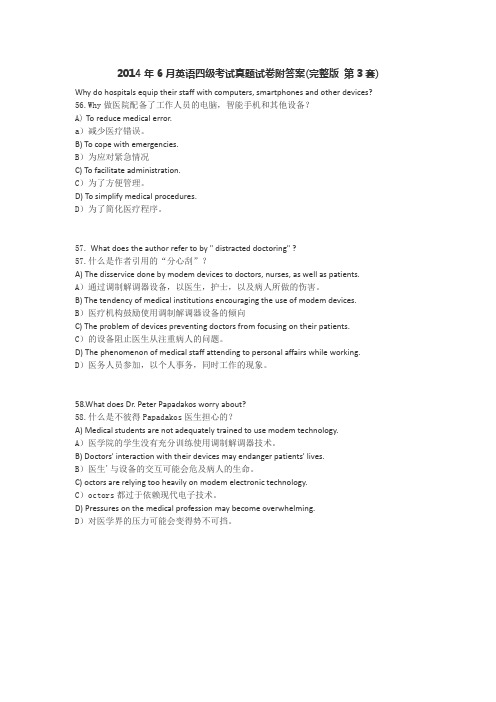
2014年6月英语四级考试真题试卷附答案(完整版第3套)Why do hospitals equip their staff with computers, smartphones and other devices?56.Why做医院配备了工作人员的电脑,智能手机和其他设备?A)To reduce medical error.a)减少医疗错误。
B) To cope with emergencies.B)为应对紧急情况C) To facilitate administration.C)为了方便管理。
D) To simplify medical procedures.D)为了简化医疗程序。
57.What does the author refer to by " distracted doctoring" ?57.什么是作者引用的“分心刮”?A) The disservice done by modem devices to doctors, nurses, as well as patients.A)通过调制解调器设备,以医生,护士,以及病人所做的伤害。
B) The tendency of medical institutions encouraging the use of modem devices.B)医疗机构鼓励使用调制解调器设备的倾向C) The problem of devices preventing doctors from focusing on their patients.C)的设备阻止医生从注重病人的问题。
D) The phenomenon of medical staff attending to personal affairs while working.D)医务人员参加,以个人事务,同时工作的现象。
58.What does Dr. Peter Papadakos worry about?58.什么是不彼得Papadakos医生担心的?A) Medical students are not adequately trained to use modem technology.A)医学院的学生没有充分训练使用调制解调器技术。
0614年英语四级翻译真题及答案详解,超详细

0614年英语四级翻译真题及答案详解,超详细2014.121.越来越多的中国年轻⼈正对旅游产⽣兴趣,这是近年来的新趋势。
年轻游客数量的不断增加,可以归因于他们迅速提⾼的收⼊和探索外部世界的好奇⼼。
随着旅⾏多了,年轻⼈在⼤城市和著名景点花的时间少了,他们反⽽更为偏远的地⽅所吸引。
有些⼈甚⾄选择长途背包旅⾏。
最近调查显⽰,很多年轻⼈想要通过旅⾏体验不同的⽂化、丰富知识、拓宽视野。
More and more Chinese young people are getting interested in traveling, which is a new trend recently. The increasing number of young travelers can be attributed to the rapid growth of income and the curiosity to explore the outside world. With more travel, youngsters spend more time in remote areas rather than big cities and famous resorts. Furthermore, some of them would choose backpacking. Recent survey showed that many young people want to experience different culture, enlarge knowledge, and broader their horizon through traveling.2.⼤熊猫是⼀种温顺的动物,长着独特的⿊⽩⽪⽑。
因其数量稀少,⼤熊猫已被列为濒危物种。
⼤熊猫对于世界⾃然基⾦会有着特殊的意义。
⾃1961年该基⾦会成⽴以来,⼤熊猫就⼀直是它的徽标。
2014年6月英语四级考试翻译题及答案全三套
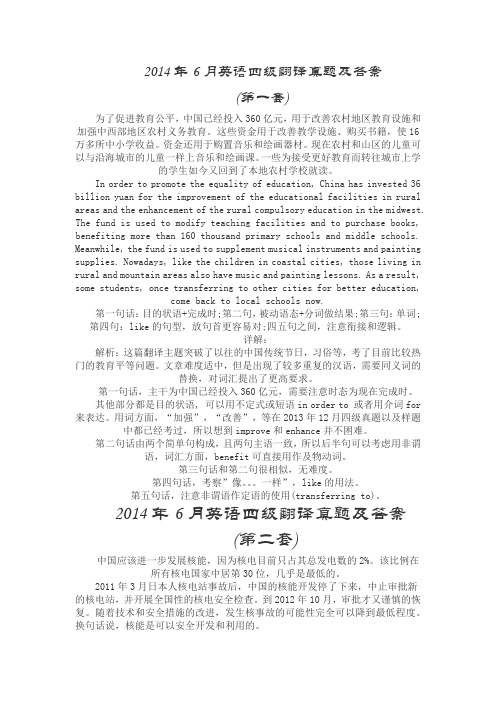
2014年6月英语四级翻译真题及答案(第一套)为了促进教育公平,中国已经投入360亿元,用于改善农村地区教育设施和加强中西部地区农村义务教育。
这些资金用于改善教学设施、购买书籍,使16万多所中小学收益。
资金还用于购置音乐和绘画器材。
现在农村和山区的儿童可以与沿海城市的儿童一样上音乐和绘画课。
一些为接受更好教育而转往城市上学的学生如今又回到了本地农村学校就读。
In order to promote the equality of education, China has invested 36 billion yuan for the improvement of the educational facilities in rural areas and the enhancement of the rural compulsory education in the midwest. The fund is used to modify teaching facilities and to purchase books, benefiting more than 160 thousand primary schools and middle schools. Meanwhile, the fund is used to supplement musical instruments and painting supplies. Nowadays, like the children in coastal cities, those living in rural and mountain areas also have music and painting lessons. As a result, some students, once transferring to other cities for better education,come back to local schools now.第一句话:目的状语+完成时;第二句,被动语态+分词做结果;第三句:单词;第四句:like的句型,放句首更容易对;四五句之间,注意衔接和逻辑。
2014年6月大学英语四级考试真题及答案完整版

2014年6月大学英语四级考试真题及答案完整版Part I Writing (30 minutes)Directions: For this part, you are allowed 30 minutes to write a short essay on the following topic. You should write at least 120 words but no more than 180 words.Suppose a foreign friend of yours is coming to visit your hometown, what is the most interesting place you would like to take him/her to see and why?注意:此部分试题请在答题卡1上作答。
Part II Listening Comprehension (30 minutes)Section ADirections: In this section, you will hear 8 short conversations and 2 long conversations. At the end of each conversation, one or more questions will be asked about what was said. Both the conversation and the questions will be spoken only once. After each question there will be a pause. During the pause, you must read the four choices marked A), B), C) and D), and decide which is the best answer. Then mark the corresponding letter on Answer Sheet 1 with a single line through the centre.注意:此部分试题请在答题卡1上作答。
2014年6月英语四级翻译真题及参考答案

2014年6月英语四级翻译真题及参考答案大学英语四级考试已经到冲刺的阶段了,为了让同学们备考充分,特地为您整理了《2014年6月大学英语四级翻译真题及参考答案》,供您参阅,希望对您的四级考试有所帮助。
欢迎访问了解更多四六级考试信息。
翻译题从原来的单句翻译变成了段落翻译,分值也加重了,和作文一样占英语四级总分的百分之十五,同学们认真备考多练习,定然能考出好的成绩。
翻译一:生活习惯多少年来,我养成了一个习惯:每天早晨四点在黎明以前起床工作。
我不出去跑步或散步,而是一下床就干活儿。
因此我对黎明前的北京的了解是在屋子里感觉到的。
我从前在什么报上读过一篇文章,讲黎明时分天安门广场上的清洁工人。
那情景必然是非常动人的,可惜我从未能见到,只是心向往之而已。
参考译文For many years, Ihave been in the habit of getting up before daybreak to start work at four.Instead of going out for a jog or walk, I’ll set about my work as soon as I’mout of bed. As a result, it is from inside my study that I've got the feel ofpredawn Beijing. Years ago, I hit upon a newspaper article about streetcleaners in Tian’anmen Square at daybreak. I t must have been a very movingscene, but what a pity I haven’t seen it with my own eyes. I can only pictureit in my mind longingly.翻译二:保护动物目前,人类的生存环境正在遭到破坏,美丽的大自然已经不那么美丽了。
2014年6月大学英语四级考试真题及详解(第三套)【圣才出品】
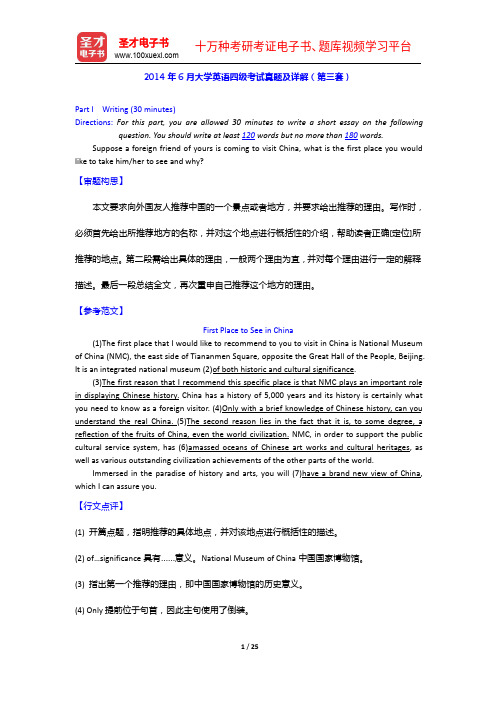
2014年6月大学英语四级考试真题及详解(第三套)Part I Writing(30minutes)Directions:For this part,you are allowed30minutes to write a short essay on the following question.You should write at least120words but no more than180words.Suppose a foreign friend of yours is coming to visit China,what is the first place you would like to take him/her to see and why?【审题构思】本文要求向外国友人推荐中国的一个景点或者地方,并要求给出推荐的理由。
写作时,必须首先给出所推荐地方的名称,并对这个地点进行概括性的介绍,帮助读者正确[定位]所推荐的地点。
第二段需给出具体的理由,一般两个理由为宜,并对每个理由进行一定的解释描述。
最后一段总结全文,再次重申自己推荐这个地方的理由。
【参考范文】First Place to See in China(1)The first place that I would like to recommend to you to visit in China is National Museum of China(NMC),the east side of Tiananmen Square,opposite the Great Hall of the People,Beijing. It is an integrated national museum(2)of both historic and cultural significance.(3)The first reason that I recommend this specific place is that NMC plays an important role in displaying Chinese history.China has a history of5,000years and its history is certainly what you need to know as a foreign visitor.(4)Only with a brief knowledge of Chinese history,can you understand the real China.(5)The second reason lies in the fact that it is,to some degree,a reflection of the fruits of China,even the world civilization.NMC,in order to support the public cultural service system,has(6)amassed oceans of Chinese art works and cultural heritages,as well as various outstanding civilization achievements of the other parts of the world.Immersed in the paradise of history and arts,you will(7)have a brand new view of China, which I can assure you.【行文点评】(1)开篇点题,指明推荐的具体地点,并对该地点进行概括性的描述。
2014年6月英语四级考试真题及答案(完整版)

2014年6⽉英语四级考试真题及答案(完整版): Part I Writing (30 minutes)Directions: For this part, you are allowed 30 minutes to write a short essay on the following topic. You should write at least 120 words but no more than 180 words.Suppose a foreign friend of yours is coming to visit your hometown, what is the most interesting place you would like to take him/her to see and why?注意:此部分试题请在答题卡1上作答。
Part II Listening Comprehension (30 minutes)Section ADirections: In this section, you will hear 8 short conversations and 2 long conversations. At the end of each conversation, one or more questions will be asked about what was said. Both the conversation and the questions will be spoken only once. After each question there will be a pause. During the pause, you must read the four choices marked A), B), C) and D), and decide which is the best answer. Then mark the corresponding letter on Answer Sheet 1 with a single line through the centre.注意:此部分试题请在答题卡1上作答。
- 1、下载文档前请自行甄别文档内容的完整性,平台不提供额外的编辑、内容补充、找答案等附加服务。
- 2、"仅部分预览"的文档,不可在线预览部分如存在完整性等问题,可反馈申请退款(可完整预览的文档不适用该条件!)。
- 3、如文档侵犯您的权益,请联系客服反馈,我们会尽快为您处理(人工客服工作时间:9:00-18:30)。
2014年6月英语四级翻译真题及答案
(第一套)
为了促进教育公平,中国已经投入360亿元,用于改善农村地区教育设施和加强中西部地区农村义务教育。
这些资金用于改善教学设施、购买书籍,使16
万多所中小学收益。
资金还用于购置音乐和绘画器材。
现在农村和山区的儿童可以与沿海城市的儿童一样上音乐和绘画课。
一些为接受更好教育而转往城市上学
的学生如今又回到了本地农村学校就读。
In order to promote the equality of education, China has invested 36 billion yuan for the improvement of the educational facilities in rural areas and the enhancement of the rural compulsory education in the midwest. The fund is used to modify teaching facilities and to purchase books, benefiting more than 160 thousand primary schools and middle schools. Meanwhile, the fund is used to supplement musical instruments and painting supplies. Nowadays, like the children in coastal cities, those living in rural and mountain areas also have music and painting lessons. As a result, some students, once transferring to other cities for better education,
come back to local schools now.
第一句话:目的状语+完成时;第二句,被动语态+分词做结果;第三句:单词;
第四句:like的句型,放句首更容易对;四五句之间,注意衔接和逻辑。
详解:
解析:这篇翻译主题突破了以往的中国传统节日,习俗等,考了目前比较热门的教育平等问题。
文章难度适中,但是出现了较多重复的汉语,需要同义词的
替换,对词汇提出了更高要求。
第一句话,主干为中国已经投入360亿元,需要注意时态为现在完成时。
其他部分都是目的状语, 可以用不定式或短语in order to 或者用介词for 来表达。
用词方面,“加强”,“改善”,等在2013年12月四级真题以及样题中都已经考过,所以想到improve和enhance并不困难。
第二句话由两个简单句构成,且两句主语一致,所以后半句可以考虑用非谓语,词汇方面,benefit可直接用作及物动词。
第三句话和第二句很相似,无难度。
第四句话,考察”像。
一样”,like的用法。
第五句话,注意非谓语作定语的使用(transferring to)。
2014年6月英语四级翻译真题及答案
(第二套)
中国应该进一步发展核能,因为核电目前只占其总发电数的2%。
该比例在所有核电国家中居第30位,几乎是最低的。
2011年3月日本人核电站事故后,中国的核能开发停了下来,中止审批新
的核电站,并开展全国性的核电安全检查。
到2012年10月,审批才又谨慎的恢复。
随着技术和安全措施的改进,发生核事故的可能性完全可以降到最低程度。
换句话说,核能是可以安全开发和利用的。
China should further develop nuclear energy because currently,nuclear power accounts for only 2% of its total generating capacity . Such proportion ranks the thirtieth in all the countries possessing nuclear power, which is almost the last.
After Japan’s nuclear power accident in March 2011, nuclear power development in China was suspended, so was the approval of new nuclear power plants. Also, the national safety check for the nuclear power was carried out. IT was not until October 2012 that the approval was prudently resumed.
With the improvement of technology and safety measures, there is little possibility for nuclear accidents to happen. In other words, there won’t be any troub le to develop and exploit the nuclear power.
这篇略难,恭喜人品。
第一二句,注意逻辑;第三句,注意“排”这个字要用主动;
第二段主要注意时态:过去时。
最后一段,伴随状语和句子间的逻辑。
详解:
试题解析:第一句,考察词汇进一步,占据,以及句子逻辑关系的判断。
第二句注意使用非限制性定语从句。
第三句话是全文最长的一句话,注意几个简单句的合并(so was B以及用逻辑词);考察词汇停止,开展。
第四句,考察“直到。
才”(n ot until)句型。
第五句,简单句,无难度,考察with表伴随。
最后一句,简单句,考察短语换句话说, 以及词汇开发利用。
2014年6月英语四级翻译真题及答案
(第三套)
中国的教育工作者早就认识到读书对于国家的意义。
有些教育工作者2003年就建议设立全民读书日。
他们强调,人们应当读好书,尤其是经典著作。
通过阅读,人们能更好的学会感恩、有责任心和与人合作,而教育的目的正是要培养这些基本素质。
阅读对于中小学生尤为重要,假如他们没有在这个关键时期培养阅读的兴趣,以后要培养成阅读的习惯就跟难了。
Chinese education workers realized the significance of reading for a nation long time ago. In 2003,some workers suggested that we have a national reading day. They emphasized that people ought to read good books especially the classic ones. Through reading, people can learn better how to be grateful, responsible and cooperative, and the goal of education is to cultivate these basic personalities. Reading is especially important for middle and primary school students;Therefore, if they don't nurture the interest of reading at that key period, it will be harder for them to develop a habit to read in the future.
解析:第一句话,注意时态(早就,应该是过去式);第二句话,注意suggest 后的虚拟语气,should do,should经常被省略;第三句话,词汇(重视)、应该
的多元性写法(不要只用should)、经典(classic而不是classical);第四句话,注意介词和两句话之间的逻辑性;第五句话无难度,要注意和第六句话之间的衔
接;最后一句话,条件句的主将从现。
